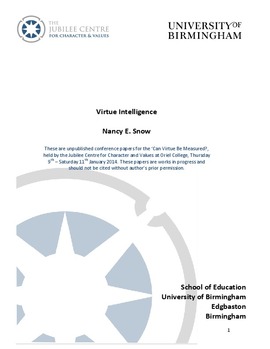| dc.description.abstract | The provocative title of this conference is, “Can Virtue Be Measured?” My answer to this question is, “Yes, it can,” and I hasten to add, “It should be.” I began thinking about whether and how to measure virtue when Jennifer Cole Wright, a psychologist from the College of Charleston, and I were approached to write a popular book on measuring virtue. Alas, that project didn’t get anywhere, but I hope that our thinking about this issue might yet bear fruit. Central to our thought is a notion suggested to us by one of our prospective editors. That is the idea of virtue intelligence.1 In part I, I sketch arguments for the importance of measuring virtue and sketch how the concept of virtue intelligence might help us to approach this venture. In II, I articulate in more detail what virtue intelligence is, and, in III, situate it within philosophical theories of virtue (here I fear I might depart from the views of my collaborator, but I’ll leave that to her to judge). In IV, I draw upon the thinking that Jen and I have done (mainly Jen’s thought) to briefly discuss what we believe to be some of the most innovative and exciting methodologies for measuring virtue now being explored. Finally, in V, I go out on a limb and suggest something rather different (from which Jen might want to dissociate herself), inspired by my recent reading on the topic of “big data.” | en_US |
